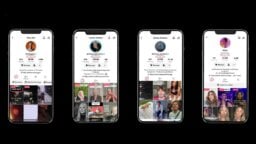Some people in the music industry never get to grips with it, but Claire McAuley learned the complexities of music publishing at a very early age.
McAuley was at kindergarten in Massachusetts – attending a school where music was incorporated into all aspects of day-to-day learning – when her teacher led the class in writing, performing and recording a special song for Father’s Day.
“That was really formative to me,” McAuley grins. “I started playing music, I kept playing and I studied music.”
So how did you work out the publishing splits across an entire class?
“There were like 25 kids!” she laughs. “I don’t know if it’s earning royalties anywhere – I should track that down!
“But when I found out about publishing, I was like, ‘Oh my God, this is for me’,” she adds. “There’s a whole side of the industry dedicated to storytelling – that’s what I want to do. I became incredibly driven to become a part of it, I just wanted to get in there and support songwriters in making a living…”
And that’s exactly what she did. She relocated to the UK with her English parents when she was nine and, while she returned to America to study at Berklee College of Music, her publishing career has been based here in Britain, despite her retaining the sunny Stateside accent.
Having decided against a career as a musician and songwriter (“Although now that I know everything I know, maybe I would have made a different choice,” she laughs), she joined the old BMG Publishing’s international team and then transferred over to Universal Music Publishing Group when UMPG snapped up BMG. There, she worked in the legal team (Jackie Alway was “an early female role model” for her) before joining advertising agency Media Arts Lab, a division of TBWA, as business affairs manager in 2014.
She “took a lot from the experience”, but says it was “like walking around with a pebble in my shoe”. “If I’m not working in publishing,” she declares, “Something feels slightly out of kilter”.
Fortunately, she was soon back in it (and reunited with Alway) as GM of the Music Publishers Association (“It’s one thing to work for one publisher, but it’s a very different thing to work for 200 different publishers,” she laughs).
She joined Warner Chappell Music in 2018, initially as VP International Operations, was promoted to SVP Global Administration in 2020 and moved into her current role as EVP of Global Rights Management last year.
And it’s clear her passion for music publishing administration burns every bit as brightly as it did in that kindergarten class. McAuley makes Warner Chappell’s publishing administration division – not traditionally seen as the liveliest part of the industry – sound like a particularly fun summer camp, although there’s also a hint of steel in her unrelenting focus on maximising royalty payments for her songwriters.
“There’s a lot of money left on the table when it comes to royalty collection.”
Like Liam Neeson in Taken, McAuley has a very particular set of skills and, if there is missing or mismatched income out there, rest assured, she will look for it, she will find it and she will… get it to its rightful owners as soon as humanly possible.
And like Neeson, she gets results. She’s credited with turning the traditionally sleepy admin division into a major revenue driver, via a transformative global approach, implementation of Warner Chappell’s new Global Match tool and significant investment in technology and staff training. And she’s kept writers happy by vastly increasing the speed at which they’re paid, and is hoping to soon make the payments system even quicker.
Meanwhile, with a new generation of writers such as Raye, Dave, Nia Archives and P2J signed up, Warner Chappell’s revenues have almost doubled in the last five years. McAuley plays down her role in any of that, instead praising leaders Guy Moot and Carianne Marshall and WC’s “unique” team spirit.
When asked about the effect of the Universal-TikTok row on her writers – she says only that, “We feel the deal we made with TikTok last year was a good one, and we will continue to advocate for increasing the value of music”.
But she’s up for talking about everything else, from the intricacies of the Mechanical Licensing Collective (MLC) to why data is much more fun than you might think…
How did you manage to turn administration into a revenue driver for Warner Chappell?
Honestly, if you’re operating in this business as a publisher, that is really the only way of looking at it. You cannot discount the importance of having excellent administration.
One of the first things I did was take a look at the structure in some of our key markets to make sure that we had the right roles in the right places. There wasn’t much of an income tracking team outside of the US and their remit was quite small.
“Anybody working in my space will appreciate there’s a lot of money left on the table when it comes to royalty collection. There’s a lot of data available, but you need to be aggressive about going out and retrieving it.”
Income tracking is really revenue assurance; making sure that what we’ve received is really what we’re meant to get paid – and with the best will in the world, we always find discrepancies. And that’s the beauty of administration: digging through the data to find we’ve either received what we’re owed or uncover those missing payments.
Anybody working in my space will appreciate there’s a lot of money left on the table when it comes to royalty collection. There’s a lot of data available, but you need to be aggressive about going out and retrieving it.
Once you get hold of that data, you can begin to unlock incremental value. And all of that incremental value really adds up.
Why does so much income still go missing in this day and age?
There’s a lot of different reasons why things go wrong, because there are so many links in the chain. You’re passing on information multiple times before it eventually gets to a rights-holder, songwriter or publisher and, by that point, information is missing or gets missed or mismatched.
That’s not through any ill intent; I don’t believe anybody is purposefully trying to obfuscate it. It’s more to do with what is being provided by the source and what they have available to them at the time.
Labels aren’t purposefully going out and saying, ‘We just don’t want songwriters to get paid’ – they’re just doing whatever they need to do to get a release out on time.
How much unmatched ‘black box’ money do you think is out there?
This is the big question! There’s no definitive report out there, but the numbers I usually hear are around $1-2 billion, which is a lot.
But I don’t think that’s far-fetched if you look at the unclaimed amounts on an ongoing basis at the MLC.
What are the prospects of that money ever finding its way to songwriters?
I feel really optimistic. Things have gotten noticeably better in the last 10 years. I can feel the shifting of the tide; existing ways of doing business have changed and they’re being challenged.
And if some of the things that seemed impossible before are now feeling more possible, then I’d like to think that, one day, that money can be repatriated out to the songwriters.
And how much income is there still to be unlocked in developing markets?
The answer depends on the market. India is a pretty interesting place, the collections at the IPRS, the performing rights society there, have got to record heights.
We’re still waiting for their distributions to correlate to those collections, but that’s making us think about how we tap into that, how to be present in that region in the right way to benefit from this huge surge in consumption.
In other territories where there aren’t collection societies, it challenges you to think differently about direct licensing models or trying to set up a different type of collective to tackle some of this licensing.
What can you do about songwriters’ concerns over artificial intelligence systems ingesting their songs?
There’s obviously a ton of work being done on the policy and legislation side which will drive what different AI models and companies are able to do. But from a pure admin point of view, we would ask for reporting on what’s being used and then we will be in a better place to do things like say, ‘This is a restricted writer list, please don’t include this songwriter’s material in your AI’.
But without knowing what the referenced songs are, it makes that really challenging to do. The main thing we need is data – it always comes back to data.
This is the same as when SoundCloud launched. I remember looking at that usage data and they didn’t really know what they had, they just created this awesome platform and, after the fact, tried to figure out whose songs have been used and who needed to get paid. You don’t want to stop innovation, but you do need to think about the value of underlying creation.
But won’t the damage have been done before legislation arrives?
You have to be proactive, stay part of the conversation and be curious, learn more about how those AI models are trained. Be friends with those companies and understand what your songwriters are doing. You don’t want to inhibit them from using AI to create – there’s this very careful balance.
There’s a world of opportunity and there are those threats. But we have to partner, I don’t think we should be picking sides, it’s about coming together and sharing to create either the best parameters for legislation or the best underlying models for data exchange.
At the BRIT Awards, Warner Chappell writer Raye called for songwriters to get points on master recordings. If that happened, what impact would it have?
I’d like to think anything is possible, but the industry hasn’t been built for that, so you’d need to think through how that would work.
A song is its own thing, so if you start awarding royalties for the masters associated with the songs, you have to think through clearly which master recordings you’re talking about. Do you mean every recording of the song, or just specific recordings? Because that creates an additional tier of complexity.
I’d like to think we can facilitate that, but it does challenge the established norm. It could get really complicated, because it’s very hard to keep track of cover versions. But we’d find a way to cope!
Did the UK industry agreement on music streaming metadata go far enough?
It did. It struck the right balance of [saying] what you need to do, without being overly prescriptive. The transparency code also struck the right balance. Those are good moves for the industry.
“It’s no good solving something in one market, because music is not just used on a local level anymore.”
The one thing I’d say is, you need to think of this truly globally. It’s no good solving something in one market, because music is not just used on a local level anymore. We need to make sure we’re solving problems on a global scale, particularly when it comes to digital and direct licensing.
Why hasn’t there been similar progress on streaming remuneration?
It’s really hard for the government to issue guidance in that way, because so much of what gets paid out is determined by individually negotiated contracts.
The one area that will continue to be looked at is overall models of how streaming platforms are being paid out. Spotify implementing its cap and saying they’re not going to pay out to rights-holders or creators for streams below a certain threshold, we’ll see more of that.
Will new models like that impact on your writers?
Well, they won’t for the vast majority of them, because they will meet the threshold. But it changes things if you are a creator and you have released music, there’s going to be a strong voice heard from DIY creators who object to that.
Of course, many of those may go on to exceed that threshold. I’m interested to see how that evolves and how it’s received, but I see it as a model that could get extended to other services in the future.
You’re on the MLC board. What have you learned from its first three years of operation?
It proves that sometimes you need a degree of interference to sort out a problem. It has resulted in more transparent accounting from DSPs and the way the MLC has looked at the matching challenge, bringing in partners to supplement the MLC’s activities, has been really progressive. It’s an approach other CMOs should be looking at globally.
The other difference is the MLC is funded by DSPs, which is another model I’d like to see in other parts of the world. It’s been a grand experiment, but it’s been very successful.
If you could change one thing about today’s music industry, right here and now, what would it be and why?
I would like every recording that gets released to have complete song information. Have the songwriter be on there, the splits be on there, have the identifiers that we need to make sure songwriters get paid and for everyone in the value chain to understand the importance of that.
“I would like every recording that gets released to have complete song information.”
People can zone out when you talk about data, but the devil is in the detail and, if you want to make sure that we continue to have a thriving music cultural scene, then you absolutely have to focus on that detail.
Should it be impossible to release a track without songwriter information being attached?
In systems, you can build in whatever validations you want. If there’s a way to build in certain validations that are reasonably supported, sure, I don’t think that would be a bad thing. You just say, you need to be able to provide this minimum information and that’s what it takes.
Finally, what do you say to people who think publishing administration is a little, well, boring?
I’ll never get bored of trying to tackle these problems. If you like a puzzle and enjoy a challenge, then it’s the perfect side of the industry for you. There is always something to solve and make better.
Ultimately, it’s about getting songwriters paid – accurately, fairly and on time. Maybe that’s boring to some people, but anybody who begins to learn more about it is surprised by the complexity, and often inspired by it too. Data is way more fun than people think!
MBUK is available as part of a DIGITAL + PHYSICAL MBW+ subscription – details through here.
All physical subscribers will receive a complimentary digital edition with each issue.
Music Business Worldwide






